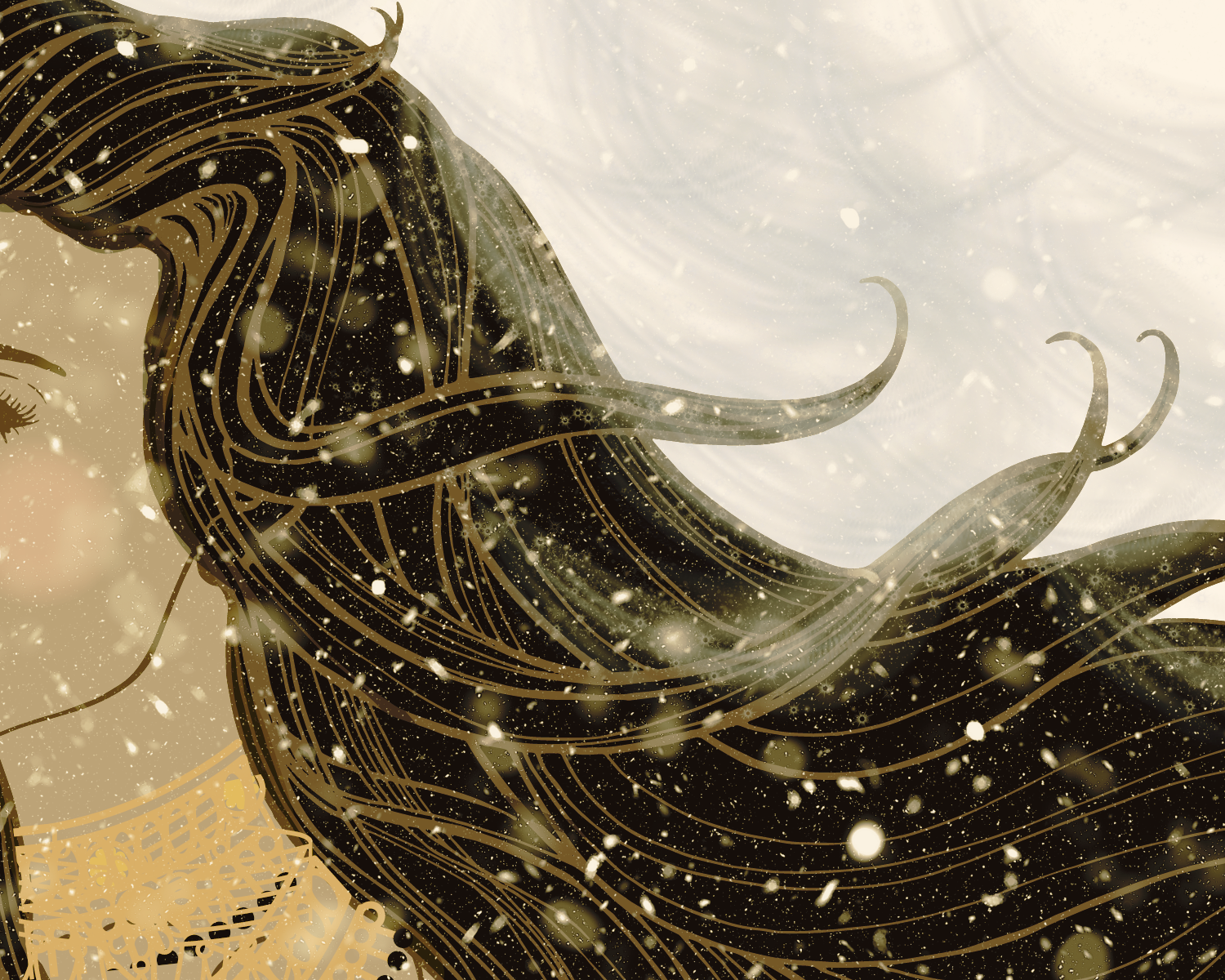
Selma’s Snow
Selma’s mother hadn’t left the house in three years. Old age had shrunken her into merely her trepidations—fearful of falling with each step she took, of hairless street dogs, of young men, and of native English speakers. And so, she found comfort in routine and the expected; the uneven spurts of cold water from the singular tank, the stiff feeling of dirt within each breath she took, and the muffled voice of her only daughter through the receiver of an outdated landline phone. Selma called her mother routinely at 9:30 P.M., exactly an hour after her shift at the train station.
Separated by 24 hours and the expanse of the Pacific Ocean, Selma’s days were composed of routine as well, though, unlike her mother, she did not find comfort in this. The expected routine had stretched her thin like indigo dye immersed in cloth. There was no comfort within the long days spent within the metal boxcar; pressing buttons to suspend the metal gate that separates cars and motorcycles from the train tracks. It was due to her extreme attentiveness that Stanley Railroad Company hadn’t experienced any driver accidents in the past fifteen years.
Selma did not consider her job to be noble. If anything, she found her role to be humiliating; to be positioned in a state of importance without feeling anything like it; like the cartoon duck in anti-smoking commercials that played on cable television.
Still, she knew her occupation to be more respectable than her untouchable ancestors, placed into a caste of laborers and ostracized into the slums of southern India. To avoid this fate, Selma’s family accepted a marriage proposal from a man who somehow had obtained a Visa to live in the States—a fact that erased his numerous drawbacks; including his chocolate complexion, heavy rural accent, and his parents being a prostitute and a pimp. Though Raj had many interested women desiring courtship, he chose Selma, particularly for her luscious hair; locks that started off as small ringlets around her forehead and straightened out until the darks of her knees. Selma’s mother had a similar head of coarse hair, hers differing with a brownish complexion at the scalp—a result of decades spent under the unforgiving sun in the tea leaf fields of Thekuddy.
To Selma’s relief, Raj proved to be a competent husband.
Selma met him on the day of their marriage; their eyes meeting for the first time through the yellow netting of the sheer wedding veil covering her face.
“I was eye-level with your chest. I looked up, and there you were,” Selma recounted as Raj carefully inched closer to her side of the mattress. This was the first night after marriage, the first time either of them would share a bed with another person other than their own mothers. As the ritual goes, Selma entered the decorated room with a warm glass of milk, shyly giving it to her newly-wed husband. The sounds of her gold jewelry matched the hesitant steps she took, keeping her gaze toward the red alta painted on her toes.
Selma’s mother was anything but a lucky wife. Selma knew this very well. Her father was indifferent and passive; a personality that meddled with her mother’s emotional sensitivities. It was assurance that she lacked, a loss which haunted Selma’s childhood. Whether it was her father spitting pomegranate and apricot seeds into her mother’s accommodating hands during mealtime, or his refusal to visit in-laws beyond the unplanned meetings at mandatory social events, Selma saw her father the way she saw local politicians—when met with responsibility, he couldn’t salvage the decency to react.
Selma had ways provide for her mother in ways her father wouldn’t. When Selma’s mother would buy a new kurti, stuffing the price tag in the back of the wood-carved alamari and placing the dress onto her frame, Selma would eagerly compliment her:
“You look like my sister, Amma! So beautiful and sexy!”
Selma’s mother would scoff, “Go do your homework, instead of wasting your time looking at me.”
Other ways of providing for her mother were more obvious attempts at providing comfort. Selma would oil her mother’s head and tweeze out the gray hairs, discard her father’s cigarette butts and water down his alcohol bottles, and save up coins for temple pushpanjali’s in her name.
Selma entered the marriage bedroom and imagined the village children sitting out on the veranda; looking into the master bedroom window with uncontainable curiosity, like a swarm of ants clamoring for bread crumbs. Ants hoping to catch a glimpse of unusual sounds from the newlyweds. Selma took heavier steps in memory of those tiny ants; hoping the sounds of her jewelry would produce more giggles and hypotheses of what the young married couple may be doing. Metal scraping her ankles with conviction. A certainty. An assurance that her life would be bearable.
Both Raj and Selma were nervous. Raj’s nerves presented as continual compliments on the milk being the perfect temperature, how there was no curd present in it, unlike his village’s bagged milk.
“The milk is perfect and sweet, Selma. Very refreshing, thank you.”
He asked if Selma wanted to drink some of it, offering to go into the kitchen and add sugar if necessary. Selma found his erratic behavior to be quite endearing. She knew that Raj was stalling the inevitable consummation of their marriage. Unlike other girls of her homeland, Selma knew exactly what was going to happen on the newly purchased mattress. Selma saw street dogs and roosters perform the same routine in her childhood. She knew that the act would eventually lead to motherhood.
Her eldest sister, Boomhini, taught her all she shouldn’t have known; how sex would be very painful and conflicting: the feeling of a foreign body entering you in ways you never knew were possible. Sometimes it feels like a needle piercing satin. Others feel a bludgeoning, the end of a hammer scraping a coconut shell.
“If you are lucky, you feel nothing at all.” Boomhini whispered. “He does, you listen. And it’s an easy transaction.”
Her sister warned her of sex. To never speak of this act yet accept it as a chore necessary to every union. If she truly didn’t want to have sex with her husband one night, her sister gave her the tools necessary to avoid it—yet also advised to use them only when necessary. An unbearable headache, heavy periods, or the chance a visiting relative might hear.
With all this in mind, Selma allowed Raj to ramble on about milk, patiently waiting for the inevitable event.
“In America, they package milk in plastic bottles. No bagged milk. That’s what I’ve heard, so we will see if it’s true. Will you be afraid of packaged milk, Selma?” Raj spoke her name, entering with a soft murmur.
Selma let a laugh slip, “I won’t be. You will be there, why be afraid?”
Raj’s heart melted at Selma’s perceived innocence. The couple continued talking throughout the night. The conversation expanded to more than just milk—they talked about how their mothers raised them, the prayers their fathers taught them, the illnesses and deaths that carried on from childhood; until dusk set in through the metal windows. They didn’t consummate their marriage that night. In fact, they didn’t have sex until their move to the United States three months later. Raj wanted to explain it well to Selma, provide her with the tools to understand why the act was so important. Selma loved the way Raj spoke, with a jittery tone of excitement, so much so that she never told him that she knew what sex was already. And so a love of convenience spawned, not intrinsically romantic yet not apathetic either, it was a trustful and satisfactory union of which both knew they were lucky for.
Thirty years later, red light fixtures glint above Selma’s balding head. Her husband’s thrift store is empty, save for the whispers of Highway 99 and the buzzing sound of the computer in front of her. The blue light casts upon her face like a watercolor swatch as her eyes scan each webpage for information on her new diagnosis of Alopecia Areata.
She was born to a lineage of farmworkers—people whose heads knew the burning sun like one knows the weight of their own stomach.
Because of this, she imagines her body must be attacking the hair on her head, the way her family plowed through red soil for decades, the sun’s generational wrath settling on her previously knee-length locks.
Her husband doesn’t notice. Raj is too preoccupied with his night classes, clinging to the generational hope of possessing an educational degree. He was married without a single hair on his oily head, the perfect spot for their toddler daughter to sit as her father walked around the living room, holding onto her tiny feet and feeling her soft giggles vibrate into his body. Selma felt, for the first time within their marriage of convenience, that she was losing her unparalleled beauty that had always juxtaposed her husband’s unforgiving features.
Their daughter was born with a mop of curly brown hair inherited from her mother’s side. Selma didn’t care too much for hair until her strands started to clog the shower drain, and her hairbrush would remove more hair than it was brushing. Now hair was all she thought of, analyzing the fashions of people on city BART and noting the small number of women and men who looked to be about her age with bald spots. She tried many remedies online, buying coconut oil and drinking apple cider vinegar. Yet every day, she woke up seeing more hair on her pillow. She began counting the strands. One morning, when she got to forty-five hairs, she decided to book the appointment and let God determine her fate.
Within the harsh lighting of her husband’s thrift store, Selma shuts her eyes. She imagines her mother back in South India, patiently waiting near the landline phone for their inevitable call. Selma remembers the night before she boarded the flight to the States, the first time she ever stepped foot onto a plane and saw the forests and beaches she memorized in childhood from the view of pelicans and crows. That night she slept in her parents’ bed with her arms wrapped around her mother’s torso; as if she could hold on forever, never needing to live without the duty of comforting her.
Selma’s mother whispered prayer after prayer, her lips vibrating the same fears Selma would encounter after the birth of her first child. Abstract fears with no beginning or ending, rooted in loss and encoated in love, like chocolate covered almonds or plastic wrapped toys.
“There’s snow in California?” Selma’s mother whispered, pausing the prayer in thought. “Sometimes there is. Raj told me.”
“Don’t let the snow into your hair, Selma,” she warned. “Salt will thin your beautiful hair out.”
That night, when she saw the first white specks along the store window, she knew what she would do. She ran outside and stood there, feeling each snowflake melt onto her scalp, like her homeland’s dams during the early months of the monsoon season. Just like her mother thousands of kilometers away, she, too, shrunk to merely her trepidations; fearful of falling with each new footprint embedded into the thickening snow. A cold wetness blanketed her. A blanketed feeling of convenience. And she cried, knowing that this was the one time her mother would let Selma disobey her.
Suggested Reading
-
about Lollipop, Lollipop![Lollipop]()
Featured • Fiction • Nonfiction
Lollipop, Lollipop
The figure moved slowly, deliberately, its shrouded head turning towards Josh. Those eyes—sharp and frigid as icepicks—stared at him. The man’s black lips never moved, even as a word pierced him like a yell: “Beware.”
Featured • Fiction • Nonfiction
-
Featured • Fiction
-
Fiction



